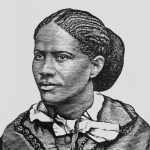Heard you that shriek? It rose
So wildly on the air,
It seem’d as if a burden’d heart
Was breaking in despair.
Saw you those hands so sadly clasped—
The bowed and feeble head—
The shuddering of that fragile form—
That look of grief and dread?
Saw you the sad, imploring eye?
Its every glance was pain,
As if a storm of agony
Were sweeping through the brain.
Her boy clings to her side,
And in her kyrtle vainly tries
His trembling form to hide.
He is not hers, although she bore
For him a mother’s pains;
He is not hers, although her blood
Is coursing through his veins!
He is not hers, for cruel hands
May rudely tear apart
The only wreath of household love
That binds her breaking heart.
His love has been a joyous light
That o’er her pathway smiled,
A fountain gushing ever new,
Amid life’s desert wild.
His lightest word has been a tone
Of music round her heart,
Their lives a streamlet blent in one—
Oh, father! must they part?
They tear him from her circling arms,
Her last and fond embrace.
Oh! never more may her sad eyes
Gaze on his mournful face.
No marvel, then, these bitter shrieks
Disturb the listening air:
She is a mother, and her heart
Is breaking in despair.





















Comment form: